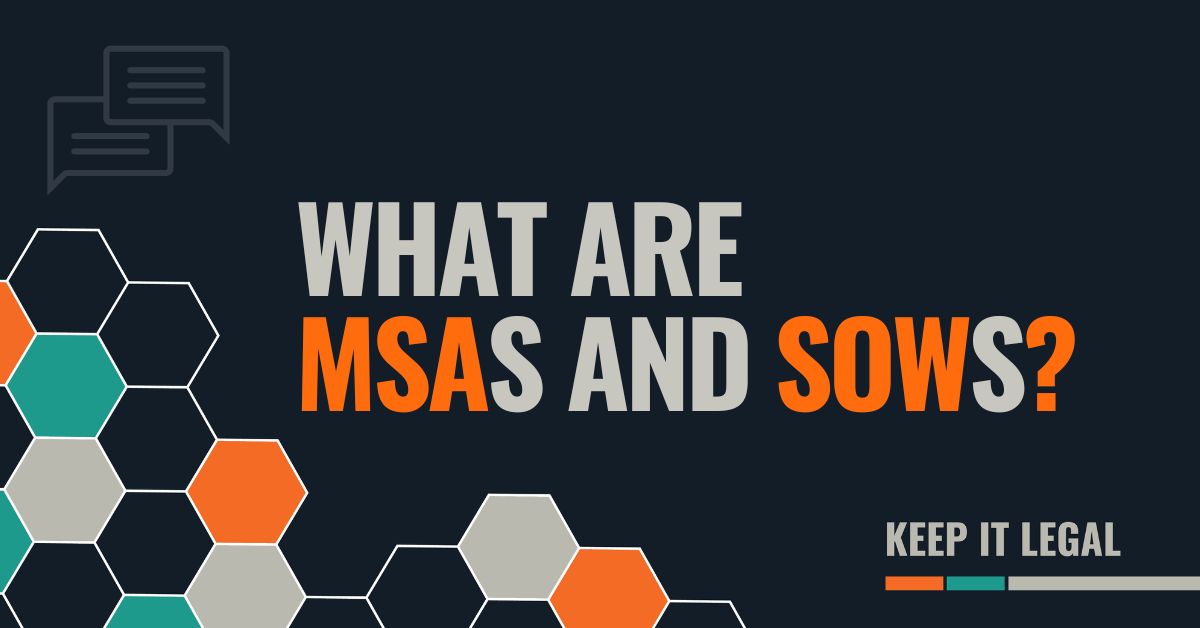Clients often ask me to review, draft, or negotiate MSAs and SOWs. These are types of contracts that are important to many types of businesses. Let’s take a look at what they are and how they work together.
Let’s say two businesses want to work together on a variety of different projects over time. They will have some terms that always stay the same, so they don’t want to have to review, draft, and negotiate a whole new contract every time they work together. But the details of each specific project will vary. This is the perfect situation for a combination of an MSA and a series of SOWs.
An MSA (Master Service Agreement) is a contract between two parties that outlines the terms and conditions for all future projects or services that will be provided by one party to the other. It serves as a framework for future transactions and establishes a long-term business relationship.
A SOW (Statement of Work) is a document that outlines the specific details, deliverables, and requirements for one project or a portion of a project. It is often included as an attachment to an MSA and specifies the work that will be performed in accordance with the terms of the MSA.
(Of course, these are general descriptions, and the specifics will vary, but let’s keep it at a high level for now.)
In short, an MSA sets the overall framework for the business relationship between two parties, while an SOW specifies the details of a specific project or engagement within that framework. So between two parties, there may be one MSA, but multiple SOWs that come and go over time.
One extra point: usually, but not always, when there’s a conflict between the terms of an MSA and a SOW, the terms of the SOW will prevail; however, this is an important point to review with strategic legal counsel if you’re about to enter into an MSA/SOW that’s been presented to you.
What terms should go in an MSA?
Some common terms that are typically included in an MSA include:
- Description of Services, including the scope of the MSA, the parties’ responsibilities, and the deliverables. This won’t usually reach the level of detail found in an SOW.
- Payment terms, such as how payment will be made, including payment schedule, invoicing, and any late payment penalties.
- Intellectual Property Rights: terms regarding ownership and protection of intellectual property, including trademarks, copyrights, and patents.
- Confidentiality: rules about confidentiality of information, trade secrets, and proprietary data.
- Termination, specifically, the circumstances under which the MSA can be terminated, and by whom.
- Liability and Indemnification: terms governing liability and indemnification in case of damage, loss, or injury. Who is responsible for paying whose legal bills?
- Dispute Resolution: A process for resolving disputes, such as mediation, arbitration, or litigation, or a combination thereof.
- Governing Law and Jurisdiction: which state/country’s law applies to the MSA? If there’s a dispute, where will it be heard?
- Amendment and Modification: provisions regarding the ability to amend or modify the MSA. Who has the right to make changes?
What terms should go into a SOW?
The terms included in a SOW will vary depending on the specific project, but some terms that are typically included in a SOW are:
- Project Objectives: A clear statement of the goals and objectives of the project, including the desired outcome and timeline.
- Scope of Work: A detailed description of the work to be performed, including tasks, deliverables, and milestones.
- Resources and Personnel: A description of the resources, including personnel, equipment, and materials, required to complete the project. For example, are you hiring people to work on this particular project? If one company doesn’t like the work of someone on the team, are they allowed to have them taken off the project?
- Schedule: A timeline for the project, including start and end dates and any important deadlines or milestones.
- Budget: A description of the budget for the project, including any specific limitations or constraints.
- Quality Standards: detailing the standards that will be used to evaluate the deliverables and the project as a whole.
- Reporting and Communication: A description of the reporting and communication requirements, including any regular status reports, project meetings, and approval processes.
- Acceptance Criteria: A description of the criteria that must be met in order for the deliverables to be considered accepted and complete.
These are just a few examples of terms that can be included in a SOW. It’s important to tailor the SOW to the specific project and to consult with the relevant parties to ensure that all the necessary information is included. Strategic legal counsel can be of assistance in this process.
If you need assistance creating or reviewing an MSA or SOW, feel free to contact me.


